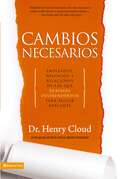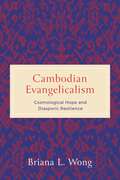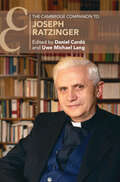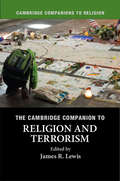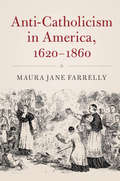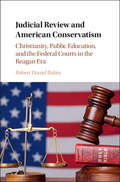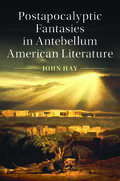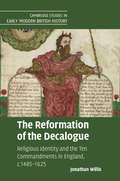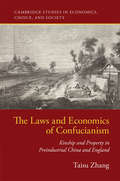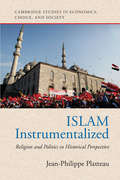- Table View
- List View
Cambios Necesarios: Empleados, negocios y relaciones de los que debemos desprendernos para seguir adelante
by Henry CloudAunque los cambios son una parte natural de los negocios y la vida, con frecuencia los enfrentamos con duda, tristeza, resignación y pesar; sin embargo, el doctor Henry Cloud tiene una perspectiva muy diferente acerca de estos. Por eso, en el presente libro señala que nuestra vida personal y profesional solo podrá mejorar cuando logremos cambios necesarios y estratégicos para alcanzar algo superior y abrir el espacio para el crecimiento profesional y personal. Sobre la base de su vasta experiencia como consultor ejecutivo y psicólogo, el autor nos ofrece en este texto intuitivo una serie de consejos y estudios de casos que nos resultarán muy útiles en nuestra vida diaria. Además, nos enseña que para alcanzar la felicidad y el éxito es fundamental saber cuándo y cómo ponerle punto final a algo o alguien que no está funcionando bien en el negocio o en una relación personal, para de esta manera seguir avanzando. Con la lectura de este material tendremos las herramientas necesarias para despedirnos de algo y continuar adelante.
Cambodian Evangelicalism: Cosmological Hope and Diasporic Resilience (World Christianity)
by Briana L. WongThe Cambodian Civil War and genocide of the late 1960s and ’70s left the country and its diaspora with long-lasting trauma that continues to reverberate through the community. In this book, Briana L. Wong explores the compelling stories of Cambodian evangelicals, their process of conversion, and how their testimonials to the Christian faith helped them to make sense of and find purpose in their trauma.Based on ethnographic fieldwork with Cambodian communities in the metropolitan areas of Philadelphia, Los Angeles, Paris, and Phnom Penh, Wong examines questions of religious identity and the search for meaning within the context of transnational Cambodian evangelicalism. While the community has grown in recent decades, Christians nevertheless make up a small minority of the predominantly Buddhist diaspora. Wong explores what it is about Christianity that makes these converts willing to risk their social standing, familial bonds,and, in certain cases, physical safety in order to identify with the faith. Contributing to ongoing dialogues on conversion, reverse mission, and multiple religious belonging, this book will appeal to students and scholars of world Christianity, missiology, and the history of Christianity, as well as Southeast Asian studies, secular sociologies, and anthropologists operating within the field of religious studies.
Cambridge Classical Studies: Revisiting Delphi
by Julia KindtRevisiting Delphi speaks to all admirers of Delphi and its famous prophecies, be they experts on ancient Greek religion, students of the ancient world, or just lovers of a good story. It invites readers to revisit the famous Oracle of Apollo at Delphi, along with Herodotus, Euripides, Socrates, Pausanias and Athenaeus, offering the first comparative and extended enquiry into the way these and other authors force us to move the link between religion and narrative centre stage. Their accounts of Delphi and its prophecies reflect a world in which the gods frequently remain baffling and elusive despite every human effort to make sense of the signs they give.
Cambridge Classical Studies: Theologies of Ancient Greek Religion
by Robin Osborne Julia Kindt Esther EidinowStudied for many years by scholars with Christianising assumptions, Greek religion has often been said to be quite unlike Christianity: a matter of particular actions (orthopraxy), rather than particular beliefs (orthodoxies). This volume dares to think that, both in and through religious practices and in and through religious thought and literature, the ancient Greeks engaged in a sustained conversation about the nature of the gods and how to represent and worship them. It excavates the attitudes towards the gods implicit in cult practice and analyses the beliefs about the gods embedded in such diverse texts and contexts as comedy, tragedy, rhetoric, philosophy, ancient Greek blood sacrifice, myth and other forms of storytelling. The result is a richer picture of the supernatural in ancient Greece, and a whole series of fresh questions about how views of and relations to the gods changed over time.
Cambridge Classical Studies: Votive Body Parts in Greek and Roman Religion
by Jessica HughesThis book examines a type of object that was widespread and very popular in classical antiquity - votive offerings in the shape of parts of the human body. It collects examples from four principal areas and time periods: Classical Greece, pre-Roman Italy, Roman Gaul and Roman Asia Minor. It uses a compare-and-contrast methodology to highlight differences between these sets of votives, exploring the implications for our understandings of how beliefs about the body changed across classical antiquity. The book also looks at how far these ancient beliefs overlap with, or differ from, modern ideas about the body and its physical and conceptual boundaries. Central themes of the book include illness and healing, bodily fragmentation, human-animal hybridity, transmission and reception of traditions, and the mechanics of personal transformation in religious rituals.
Cambridge Companions to Religion: The Cambridge Companion to Christian Political Theology
by Craig HoveyInterest in political theology has surged in recent years, and this accessible volume provides a focused overview of the field. Many are asking serious questions about religious faith in secular societies, the origin and function of democratic polities, worldwide economic challenges, the shift of Christianity's center of gravity to the global south, and anxieties related to bold and even violent assertions of theologically determined political ideas. In fourteen original essays, authors examine Christian political theology in order to clarify the contemporary discourse and some of its most important themes and issues. These include up-to-date, critical engagements with historical figures like Augustine, Thomas Aquinas, and Immanuel Kant; discussions of how the Bible functions theopolitically; and introductions to key movements such as liberation theology, Catholic social teaching, and radical orthodoxy. An invaluable resource for students and scholars in theology, the Companion will also be beneficial to those in history, philosophy, and politics.
Cambridge Companions to Religion: The Cambridge Companion to Joseph Ratzinger (Cambridge Companions To Religion Ser.)
by Uwe Michael Lang Daniel CardóCambridge Companions to Religion: The Cambridge Companion to Reformed Theology
by Nimmo, Paul T. and Fergusson, David A. S. Paul T. Nimmo Fergusson, David A. S.This Companion offers an introduction to Reformed theology, one of the most historically important, ecumenically active, and currently generative traditions of doctrinal enquiry, by way of reflecting upon its origins, its development, and its significance. The first part, Theological Topics, indicates the distinct array of doctrinal concerns which gives coherence over time to the identity of this tradition in all its diversity. The second part, Theological Figures, explores the life and work of a small number of theologians who have not only worked within this tradition, but have constructively shaped and inspired it in vital ways. The final part, Theological Contexts, considers the ways in which the resultant Reformed sensibilities in theology have had a marked impact both upon theological and ecclesiastical landscapes in different places and upon the wider societal landscapes of history. The result is a fascinating and compelling guide to this dynamic and vibrant theological tradition.
Cambridge Companions to Religion: The Cambridge Companion to Religion and Terrorism (Cambridge Companions to Religion)
by Lewis James R.There is currently much discussion regarding the causes of terrorist acts, as well as the connection between terrorism and religion. Terrorism is attributed either to religious 'fanaticism' or, alternately, to political and economic factors, with religion more or less dismissed as a secondary factor. The Cambridge Companion to Religion and Terrorism examines this complex relationship between religion and terrorism phenomenon through a collection of essays freshly written for this volume. Bringing varying approaches, from the theoretical to the empirical, to the topic, the Companion includes an array of subjects, such as radicalization, suicide bombing, and rational choice, as well as specific case studies. The result is a richly textured collection that prompts readers to critically consider the cluster of phenomena that we have come to refer to as 'terrorism,' and terrorism's relationship with the similarly problematic set of phenomena that we call 'religion. '
Cambridge Companions to Religion: The Cambridge Companion to the Hebrew Bible/Old Testament
by Marvin A. Sweeney Chapman, Stephen B. and Sweeney, Marvin A. Stephen B. ChapmanThis Companion offers a concise and engaging introduction to the Hebrew Bible or Old Testament. Providing an up-to-date 'snapshot' of scholarship, it includes essays, specially commissioned for this volume, by twenty-three leading scholars. The volume examines a range of topics, including the historical and religious contexts for the contents of the biblical canon, and critical approaches and methods, as well as newer topics such as the Hebrew Bible in Islam, Western art and literature, and contemporary politics. This Companion is an excellent resource for students at university and graduate level, as well as for laypeople and scholars in other fields who would like to gain an understanding of the current state of the academic discussion. The book does not presume prior knowledge, nor does it engage in highly technical discussions, but it does go into greater detail than a typical introductory textbook.
Cambridge Companions to Religion: The Cambridge Companion to the Summa Theologiae
by Denys Turner McCosker, Philip and Turner, Denys Philip MccoskerArguably the most influential work of systematic theology in the history of Christianity, Thomas Aquinas' Summa Theologiae has shaped all subsequent theology since it was written in the late thirteenth century. This Companion features essays from both specialists in Aquinas' thought and from constructive contemporary theologians to demonstrate how to read the text effectively and how to relate it to past and current theological questions. The authors thoroughly examine individual topics addressed in the Summa, such as God, the Trinity, eternity, providence, virtue, grace, and the sacraments, making the text accessible to students of all levels. They further discuss the contextual, methodological, and structural issues surrounding the Summa, as well as its interaction with a variety of religious traditions. This volume will not only allow readers to develop a comprehensive multi-perspectival understanding of Aquinas' main mature theological work, but also promote dialogue about the vital role of the Summa in theology today.
Cambridge Critical Guides: Aquinas’s Disputed Questions on Evil
by M. V. DoughertyThomas Aquinas's Disputed Questions on Evil is a careful and detailed analysis of the general topic of evil, including discussions on evil as privation, human free choice, the cause of moral evil, moral failure, and the so-called seven deadly sins. This collection of ten, specially commissioned new essays, the first book-length English-language study of Disputed Questions on Evil, examines the most interesting and philosophically relevant aspects of Aquinas's work, highlighting what is distinctive about it and situating it in relation not only to Aquinas's other works but also to contemporary philosophical debates in metaphysics, ethics, and philosophy of action. The essays also explore the history of the work's interpretation. The volume will be of interest to researchers in a broad range of philosophical disciplines including medieval philosophy and history of philosophy, as well as to theologians.
Cambridge Essential Histories: Anti-Catholicism in America, 1620–1860 (Cambridge Essential Histories)
by Farrelly Maura JaneUsing fears of Catholicism as a mechanism through which to explore the contours of Anglo-American understandings of freedom, Anti-Catholicism in America, 1620-1860 reveals the ironic role that anti-Catholicism played in defining and sustaining some of the core values of American identity, values that continue to animate our religious and political discussions today. Farrelly explains how that bias helped to shape colonial and antebellum cultural understandings of God, the individual, salvation, society, government, law, national identity, and freedom. In so doing, Anti-Catholicism in America, 1620-1860 provides contemporary observers with a framework for understanding what is at stake in the debate over the place of Muslims and other non-Christian groups in American society.
Cambridge Historical Studies in American Law and Society: Judicial Review and American Conservatism
by Rubin Robert DanielThe Christian Right of the 1980s forged its political identity largely in response to what it perceived as liberal 'judicial activism'. Robert Daniel Rubin tells this story as it played out in Mobile, Alabama. There, a community conflict pitted a group of conservative evangelicals, a sympathetic federal judge, and a handful of conservative intellectuals against a religious agnostic opposed to prayer in schools, and a school system accused of promoting a religion called 'secular humanism'. The twists in the Mobile conflict speak to the changes and continuities that marked the relationship of 1980s' religious conservatism to democracy, the courts, and the Constitution. By alternately focusing its gaze on the local conflict and related events in Washington, DC, this book weaves a captivating narrative. Historians, political scientists, and constitutional lawyers will find, in Rubin's study, a challenging new perspective on the history of the Christian Right in the United States.
Cambridge Introductions to Music
by David HileyWhat is Gregorian chant, and where does it come from? What purpose does it serve, and how did it take on the form and features which make it instantly recognizable? Designed to guide students through this key topic, this book answers these questions and many more. David Hiley describes the church services in which chant is performed, takes the reader through the church year, explains what Latin texts were used, and, taking Worcester Cathedral as an example, describes the buildings in which it was sung. The history of chant is traced from its beginnings in the early centuries of Christianity, through the Middle Ages, the revisions in the sixteenth and seventeenth centuries, and the restoration in the nineteenth and twentieth. Using numerous music examples, the book shows how chants are made and how they were notated. An indispensable guide for all those interested in the fascinating world of Gregorian chant.
Cambridge Latin American Studies: Theater of a Thousand Wonders
by Taylor William B.The great many shrines of New Spain have become long-lived sites of shared devotion and contestation across social groups. They have provided a lasting sense of enchantment, of divine immanence in the present, and a hunger for epiphanies in daily life. This is a story of consolidation and growth during the seventeenth and eighteenth centuries, rather than one of rise and decline in the face of early stages of modernization. Based on research in a wide array of manuscript and printed primary sources, and informed by recent scholarship in art history, religious studies, anthropology, and history, this is the first comprehensive study of shrines and miraculous images in any part of early modern Latin America.
Cambridge Medieval Textbooks: Christianity, Judaism, and Islam
by Christine Caldwell AmesJews, Christians, and Muslims in the Middle Ages were divided in many ways. But one thing they shared in common was the fear that God was offended by wrong belief. Medieval Heresies: Christianity, Judaism, and Islam is the first comparative survey of heresy and its response throughout the medieval world. Spanning England to Persia, it examines heresy, error, and religious dissent - and efforts to end them through correction, persuasion, or punishment - among Latin Christians, Greek Christians, Jews, and Muslims. With a lively narrative that begins in the late fourth century and ends in the early sixteenth century, Medieval Heresies is an unprecedented history of how the three great monotheistic religions of the Middle Ages resembled, differed from, and even interrelated with each other in defining heresy and orthodoxy.
Cambridge Middle East Studies: Hizbullah and the Politics of Remembrance
by Bashir SaadeBorn out of the Israeli occupation of the South of Lebanon, the political armed group Hizbullah is a powerful player within both Lebanon and the wider Middle East. Understanding how Hizbullah has, since the 1980s, developed its own reading of the nature of the Lebanese state, national identity and historical narrative is central to grasping the political trajectory of the country. By examining the ideological production of Hizbullah, especially its underground newspaper Al Ahd, Bashir Saade offers an account of the intellectual continuity between the early phases of Hizbullah's emergence onto the political stage and its present day organization. Saade argues here that this early intellectual activity, involving an elaborate understanding of the past and history had a long lasting impact on later cultural production, one in which the notion and practice of Resistance has been central in developing national imaginaries.
Cambridge Studies in American Literature and Culture: Postapocalyptic Fantasies in Antebellum American Literature (Cambridge Studies in American Literature and Culture #164)
by John HayEven before the Civil War, American writers were imagining life after a massive global catastrophe. For many, the blank slate of the American continent was instead a wreckage-strewn wasteland, a new world in ruins. Bringing together epic and lyric poems, fictional tales, travel narratives, and scientific texts, Postapocalyptic Fantasies in Antebellum American Literature reveals that US authors who enthusiastically celebrated the myths of primeval wilderness and virgin land also frequently resorted to speculations about the annihilation of civilizations, past and future. By examining such postapocalyptic fantasies, this study recovers an antebellum rhetoric untethered to claims for historical exceptionalism - a patriotic rhetoric that celebrates America while denying the United States a unique position outside of world history. As the scientific field of natural history produced new theories regarding biological extinction, geological transformation, and environmental collapse, American writers responded with wild visions of the ancient past and the distant future.
Cambridge Studies in Contentious Politics: Religious War and Religious Peace in Early Modern Europe
by Te Brake Wayne P.Religious War and Religious Peace in Early Modern Europe presents a novel account of the origins of religious pluralism in Europe. Combining comparative historical analysis with contentious political analysis, it surveys six clusters of increasingly destructive religious wars between 1529 and 1651, analyzes the diverse settlements that brought these wars to an end, and describes the complex religious peace that emerged from two centuries of experimentation in accommodating religious differences. Rejecting the older authoritarian interpretations of the age of religious wars, the author uses traditional documentary sources as well as photographic evidence to show how a broad range Europeans - from authoritative elites to a colorful array of religious 'dissenters' - replaced the cultural 'unity and purity' of late-medieval Christendom with a variable and durable pattern of religious diversity, deeply embedded in political, legal, and cultural institutions.
Cambridge Studies in Early Modern British History: Anglican Enlightenment
by William J. BulmanThis is an original interpretation of the early European Enlightenment and the religious conflicts that rocked England and its empire under the later Stuarts. In a series of vignettes that move between Europe and North Africa, William J. Bulman shows that this period witnessed not a struggle for and against new ideas and greater freedoms, but a battle between several novel schemes for civil peace. Bulman considers anew the most apparently conservative force in post-Civil War English history: the conformist leadership of the Church of England. He demonstrates that the church's historical scholarship, social science, pastoral care and political practice amounted not to a culturally backward spectacle of intolerance, but to a campaign for stability drawn from the frontiers of erudition and globalization. In seeking to sever the link between zeal and chaos, the church and its enemies were thus united in an Enlightenment project, but bitterly divided over what it meant in practice.
Cambridge Studies in Early Modern British History: Religious Identity and the Ten Commandments in England, c.1485–1625 (Cambridge Studies in Early Modern British History)
by Jonathan WillisThe Reformation of the Decalogue tells two important but previously untold stories: of how the English Reformation transformed the meaning of the Ten Commandments, and of the ways in which the Ten Commandments helped to shape the English Reformation itself. Adopting a thematic structure, it contributes new insights to the history of the English Reformation, covering topics such as monarchy and law, sin and salvation, and Puritanism and popular religion. It includes, for the first time, a comprehensive analysis of surviving Elizabethan and Early Stuart 'commandment boards' in parish churches, and presents a series of ten case studies on the Commandments themselves, exploring their shifting meanings and significance in the hands of Protestant reformers. Willis combines history, theology, art history and musicology, alongside literary and cultural studies, to explore this surprisingly neglected but significant topic in a work that refines our understanding of British history from the 1480s to 1625.
Cambridge Studies in Early Modern British History: The Political Bible in Early Modern England
by Kevin KilleenThis illuminating new study considers the Bible as a political document in seventeenth-century England, revealing how the religious text provided a key language of political debate and played a critical role in shaping early modern political thinking. Kevin Killeen demonstrates how biblical kings were as important in the era's political thought as any classical model. The book mines the rich and neglected resources of early modern quasi-scriptural writings - treatise, sermon, commentary, annotation, poetry and political tract - to show how deeply embedded this political vocabulary remained, across the century, from top to bottom and across all religious positions. It shows how constitutional thought, in this most tumultuous era of civil war, regicide and republic, was forged on the Bible, and how writers ranging from King James, Joseph Hall or John Milton to Robert Filmer and Thomas Hobbes can be better understood in the context of such vigorous biblical discourse.
Cambridge Studies in Economics, Choice, and Society: Kinship and Property in Preindustrial China and England (Cambridge Studies in Economics, Choice, and Society)
by Taisu ZhangTying together cultural history, legal history, and institutional economics, The Laws and Economics of Confucianism: Kinship and Property in Pre-Industrial China and England offers a novel argument as to why Chinese and English pre-industrial economic development went down different paths. The dominance of Neo-Confucian social hierarchies in Late Imperial and Republican China, under which advanced age and generational seniority were the primary determinants of sociopolitical status, allowed many poor but senior individuals to possess status and political authority highly disproportionate to their wealth. In comparison, landed wealth was a fairly strict prerequisite for high status and authority in the far more 'individualist' society of early modern England, essentially excluding low-income individuals from secular positions of prestige and leadership. Zhang argues that this social difference had major consequences for property institutions and agricultural production.
Cambridge Studies in Economics, Choice, and Society: Religion and Politics in Historical Perspective (Cambridge Studies in Economics, Choice, and Society)
by Jean-Philippe PlatteauIn this book, economist Jean-Philippe Platteau addresses the question: does Islam, the religion of Muslims, bear some responsibility for a lack of economic development in the countries in which it dominates? In his nuanced approach, Platteau challenges the widespread view that the doctrine of Islam is reactionary in the sense that it defends tradition against modernity and individual freedom. He also questions the view that fusion between religion and politics is characteristic of Islam and predisposes it to theocracy. He disagrees with the substantivist view that Islam is a major obstacle to modern development because of a merging of religion and the state, or a fusion between the spiritual and political domains. But he also identifies how Islam's decentralized organization, in the context of autocratic regimes, may cause political instability and make reforms costly.
